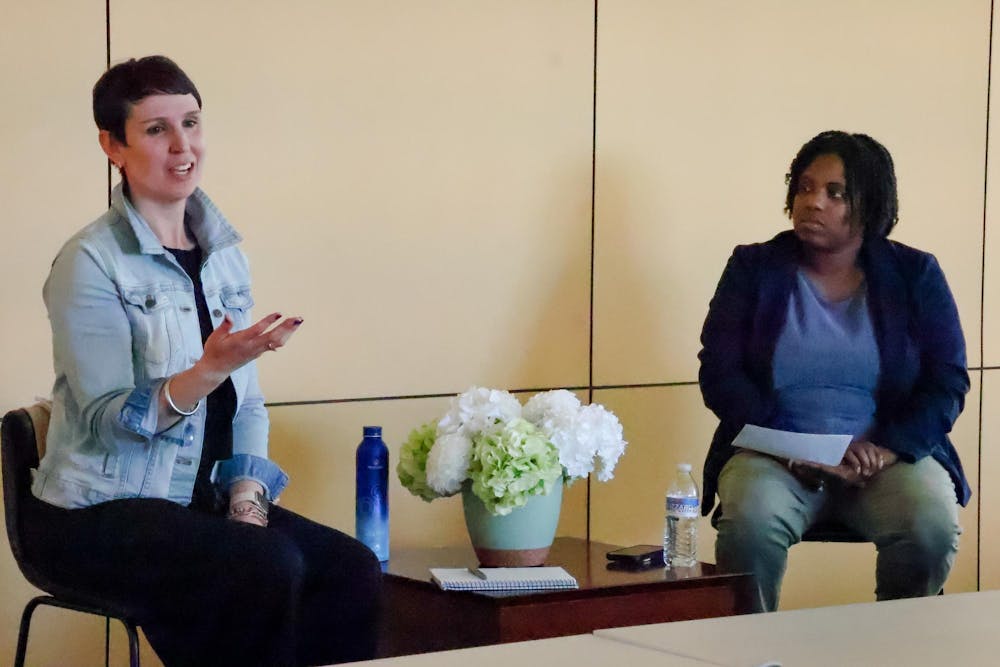In a Thursday afternoon talk, Caitie Whelan ’07.5, a former senior foreign policy advisor in Congress, discussed strategies for people to empower themselves and their communities as they attempt to navigate a tumultuous political landscape.
The event, titled “How We Navigate This Complex Political Moment,” was hosted by the School of Public Health’s Office of Diversity, Equity and Inclusion.
Whelan opened by encouraging the crowd to stay resilient despite feelings of powerlessness many might experience when it comes to making political change.
“We have no idea of the downstream implications of our actions, and it’s so easy to feel like I am just one person in the face of so much that’s happening so fast,” she said.
Whelan emphasized this point with the story of a group of female activists whose protests against nuclear arms testing in the 1950s — despite feeling insignificant in their methods — helped lead to a nuclear testing ban. Due to their efforts, the activists inadvertently caught the eye of Benjamin Spock, a notable social activist against the use of nuclear arms, Whelan said.
“I love that story because it’s so hard to quantify impact in the moment,” she said.
Whelan then recommended four separate strategies — “separating the signal from the sound,” contacting members of Congress, voting in local elections and building the world “we want to live in” — to help navigate the complexities of the current moment.
With social media platforms overloaded with information, Whelan encouraged audience members to be intentional about their news consumption.
“Knowledge is power, but not all news is knowledge, especially with the volume that we’re contending with right now,” she said.
Whelan argued that by following more local media sources that are more “human-centered,” keeping up with news can be made easier while also helping bridge the gap between federal actions and how it impacts local communities.
Whelan also encouraged the audience to engage with their respective members of Congress, despite a widespread feeling that Congress is “irrelevant” in the current political atmosphere.
“If the members of Congress do not hear from their constituents, and if we are upset about something, they can take our silence as consent,” she said.
Similarly, Whelan says that providing gratitude to representatives can have a profound impact. “If they do or say something that we think is great, and we don’t let them know, they might not think that it mattered,” she said.
By following the actions local members of Congress take and voting in local elections, the electorate can learn how to be a useful resource for their representatives, Whelan added.
She said “as public health professionals and also just as folks who are represented in Congress,” it is important to “tell a story that speaks to the urgency of the thing that we care about in our politicians’ district.”
“How can we tell a story that speaks to the urgency of the thing that we care about in our politicians’ district?” she asked.
Whelan concluded her talk by speaking to the importance of creating a “culture of democracy,” centered in building a strong community that makes it “easiest for those who have it the hardest.”
Whelan shared an anecdote of a friend who committed to doing one daily act of kindness. Whelan said she was “amazed … that we each have an opportunity to just contribute to that culture (of democracy) a little bit more.”
Whelan’s talk was followed by a Q&A session in which she addressed topics including the value of staying diligent in order to realize policy change. But she encouraged the audience to strike a balance between seeking immediate action and patience.
“To be able to sustain ourselves, I think that’s the orientation that I would have,” she said. “How can I protect my care so that the thing that I care about can be made manifest in the world?”
Attendee Petros Engelhardt ’27 said Whelan’s advice to maintain relationships with members of Congress resonated with him.
“Telling (my representatives), ‘these are the things I want and these are the things my community wants,’ I think will help me feel better in day-to-day situations when there’s national things we can’t control,” he said.
Jonathan Kim is a senior staff writer covering Science and Research. He is a first-year student from Culver City, California planning to study Public Health or Health and Human Biology. In his free time, you can find him going for a run, working on the NYT crossword or following the Dodgers.





